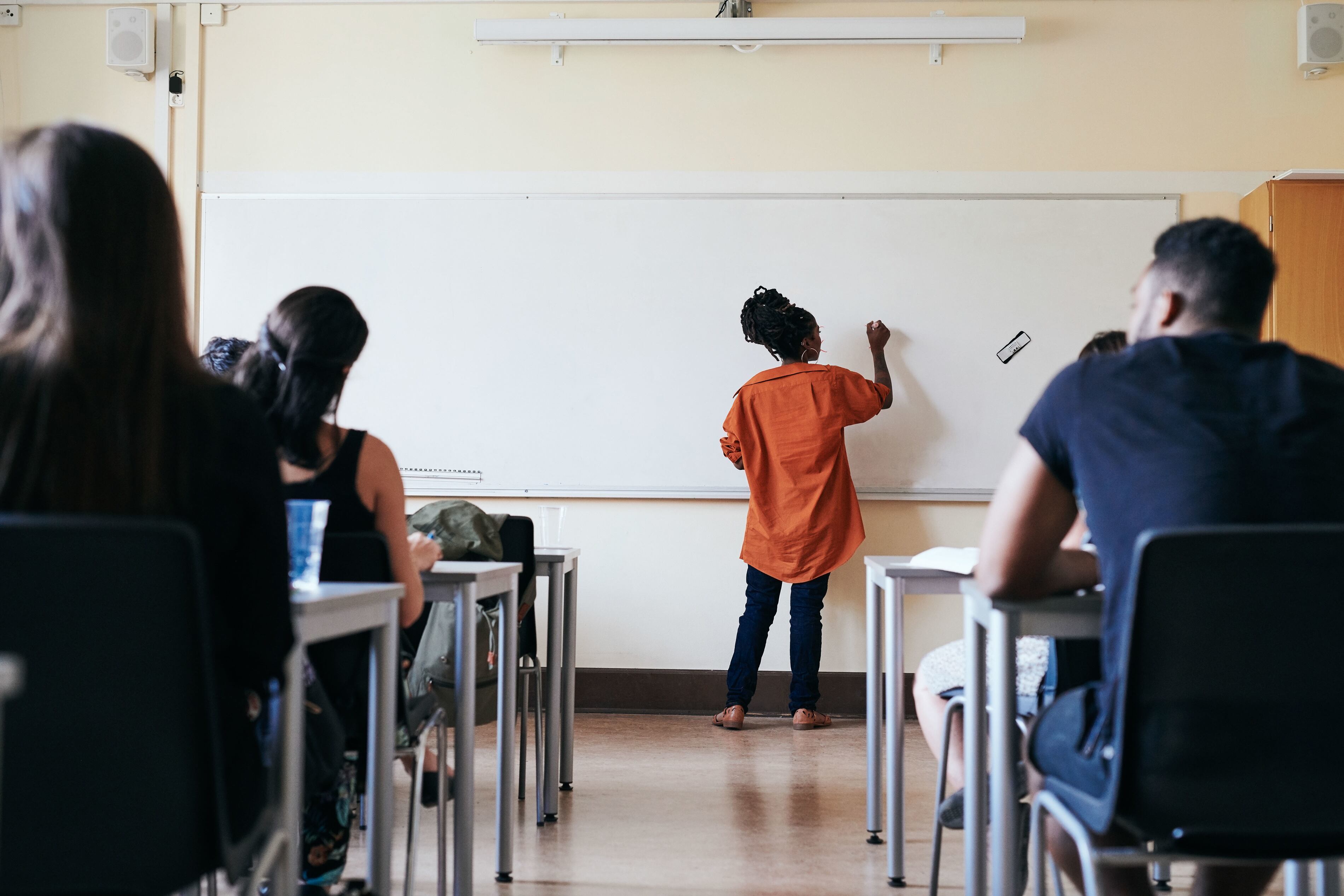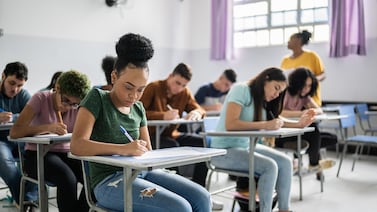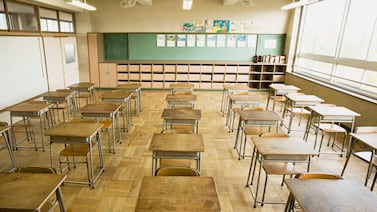Sign up for Chalkbeat Newark’s free newsletter to keep up with the city’s public school system.
Ashley Daniels knew she liked kids and had enjoyed working as a camp counselor. But, before applying for a job at Philip’s Academy Charter School, she had never worked in education.
So when she got the position as a student aide, she wasn’t sure what to expect. She was pleasantly surprised.
After about an hour at the Newark school, Daniels thought: This is it.
“Even though I didn’t know what a career as a teacher would look like for me, I just knew I wanted to stay here,” she said.
Daniels, who is Black, is one of dozens of teachers Philip’s has hired since launching a strategic effort to diversify its staff about five years ago.
Since 2018, the percentage of Philip’s teachers who are Black or Latino has climbed from 53% to 81%.
In early September, Philip’s efforts were recognized when the school received a New Jersey Department of Education Lighthouse Award for diversifying the teacher workforce, an area in which Newark schools are generally struggling.
According to recent data, 90% of Newark’s traditional public school student population is Black or Latino, but just over 50% of Newark’s teachers identify the same way.
At Philip’s, 98% of students are Black or Latino.
Studies have shown that diversity within teaching staff, among other factors, is critical to the success of students. A lack of teachers of color can negatively impact attendance rates, test scores, and suspension rates.
Philip’s is seeking to change that reality for its students. Its doors opened just over 30 years ago and the school now serves around 600 students, from pre-K through eighth grade. The private-turned-charter school previously applied to expand to serve grades 9-12, but the state education department blocked that request last year.
One step the school is taking to diversify its faculty is investing in young, less-experienced teachers like Daniels. Since being hired in 2018, she has worked as a student aide, teacher associate, and now as a full-time teacher while she earns a master’s in education.
“People saw this in me and encouraged me to grow as an educator,” said Daniels. “Now I say the only way I’d leave this job is if I leave the state.”
About three years ago, Philip’s principal Yasmeen Sampson sought to expand efforts to diversify the school’s staff. At the time, work with an outside consultant was already underway, the primary goal being to survey current faculty about their long-term needs.
In light of the survey’s responses, Sampson launched a “recruit and retain” initiative, a multi-step plan to hire new faculty who align with the school’s mission and to keep the teachers they already have.
Sampson has incorporated more professional development, hired a faculty life coach who comes to campus twice a week, and offered free courses on financial literacy.
“We made our teachers the ambassadors for Philip’s, and it just kind of took off really nicely,” she said. “Now it’s like clockwork. We always have teachers saying ‘Hey, I know this person. Do we have a vacancy?’”
Finances have also played a significant role in Sampson’s ability to carry out her ideas.
“Philip’s has been blessed with a lot of financial support. We apply for any and every grant. Anything that can remotely bring in support, we’re going for it,” said Sampson. “The charter platform allows us to keep bringing in resources.”
Richard Alua, Philip’s dean of culture, said the way faculty view their jobs is also crucial in keeping them long term. Teachers are encouraged to take a holistic approach to students’ success beyond test scores, which he said makes both kids and faculty happier.
“That is the reason we have kids literally running to our school. We stand outside and tell them to slow down with a smile and a hug,” said Alua.
That holistic approach also means ensuring that students have dependable role models at school, particularly role models that look like them. Alua said that, as a Black man, he is aware of this responsibility, and does not take it lightly.
“I became the person I was searching for as a kid,” he said. “I have to put my cape on each morning, and I love it.”
Last year, Philip’s hired seven male teachers. For students like fourth grader Samuel Coleman, seeing teachers they identify with has made a difference.
“When I first met Mr. Vasquez in second grade I was surprised because not a lot of students get male teachers. A lot of students talked about how smart he is in math. Now that I’m in fourth grade I get to have him and it’s pretty fun,” said Samuel Coleman. “I really like to learn about math now.”
Samuel’s mother, Nicole Coleman, said she’s shocked that her son often wants to come home and play math games.
“I think it says a lot about the education he’s receiving and how excited he is about school,” said Nicole Coleman.
After enrolling her son in pre-K at Philip’s, Nicole Coleman was so impressed by his experience that she left her job at a Newark public school to teach drama at the charter school.
“I realized I wanted to be a part of the environment here,” she said. “This was an opportunity for me to be a part of an educational system that was actually thriving.”
As a member of Philip’s recruit and retain committee, Nicole Coleman brought in her son’s English teacher, Kalika Glover. According to Samuel Coleman, it’s been a success.
“When she teaches me something she makes it fun. I get excited to answer questions,” he said.
Nicole Coleman said she’s still grateful each day that they found Philip’s.
“I think that representation matters, as a parent and as a teacher. Our teaching faculty reflects our students and they’re able to connect with that,” she said. “We tell our students that they should be celebrating who they are every day. It starts at home and in the education system.”
Samantha Lauten is a fall reporting intern for Chalkbeat Newark covering public education in the city. Get in touch with Samantha at slauten@chalkbeat.org or reach the bureau newsroom at newark.tips@chalkbeat.org.







